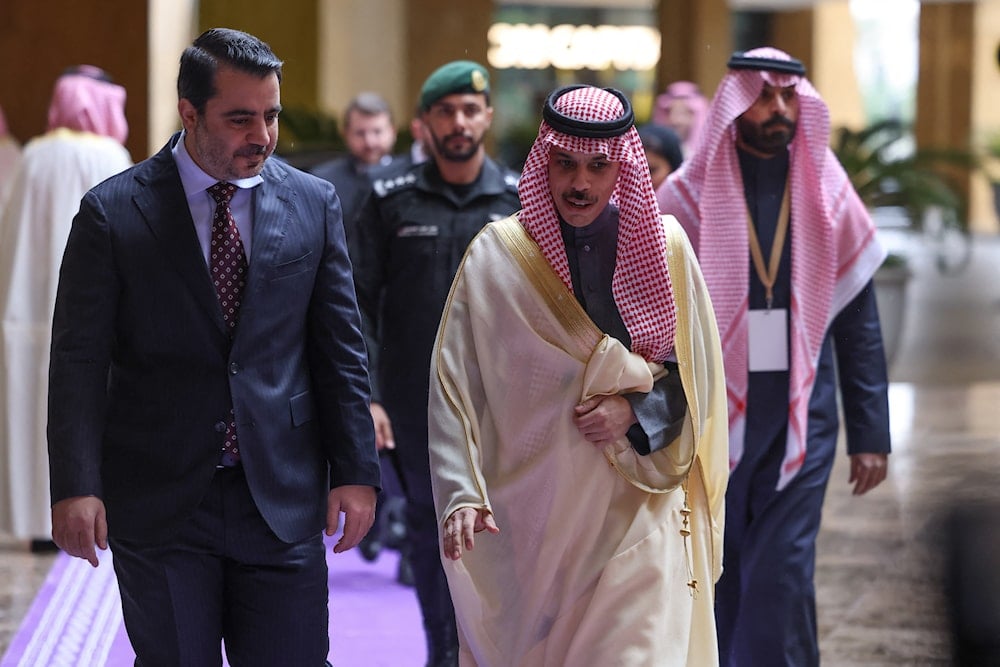Arab, EU top officials in Riyadh for discussions on Syria support
A Saudi official told AFP that Sunday’s meeting builds on earlier discussions about Syria’s future, held in Jordan last month.
-

Saudi Foreign Minister Faisal bin Farhan (R) welcomes his Syrian counterpart Asaad al-Shaibani before attending an Arab officials' meeting in Riyadh, on January 12, 2025 (AFP)
Senior diplomats from the Middle East and Europe are scheduled to convene in the Saudi capital on Sunday to discuss Syria following the fall of President Bashar al-Assad.
According to analysts, Saudi Arabia, the region's largest economy, is aiming to expand its influence in Syria after Islamist-led groups ousted al-Assad last month.
A Saudi official told AFP on Saturday that the discussions are set to take place in two sessions. The first will involve Arab officials, while the second will feature broader participation, including representatives from Turkiye, France, the European Union, and the United Nations.
The head of Syria’s new administration, Ahmad al-Sharaa, who headed the main coalition responsible for overthrowing al-Assad, is advocating for the lifting of international sanctions imposed on Syria.
The United States and the European Union imposed sanctions on al-Assad’s regime in the wake of anti-government protests in 2011, which escalated into a prolonged war on the country.
The war, which has lasted over 13 years, has claimed more than 500,000 lives, devastated Syria's infrastructure, and impoverished its population. Millions have been displaced, with many seeking refuge in Europe.
EU foreign policy chief Kaja Kallas indicated on Friday that the bloc might begin easing sanctions if Syria’s new leadership works toward forming an inclusive government that safeguards minority rights.
Saudi Arabia severed ties with al-Assad's government in 2012 and had been a vocal proponent of his removal. However, in 2023, it hosted an Arab League summit where al-Assad was reinstated into the regional community.
This month, the Kingdom has dispatched food, shelter, and medical aid to Syria via land and air.
"This summit sends the message that Saudi Arabia wants to take the lead on coordinating the regional effort to support Syria's recovery," suggested Anna Jacobs, a non-resident fellow at the Arab Gulf States Institute in Washington.
However, she pointed out that "the big question is how much time and how many resources will Saudi Arabia devote to this effort? And what is possible with many of the sanctions remaining in place?"
Read more: Western powers warn Syria over foreign fighters in army: Reuters
Riyadh 'positively approaching' Syria’s new leaders
The Saudi official told AFP that Sunday’s meeting builds on earlier discussions about Syria’s future, held in Jordan last month.
After the Aqaba talks, diplomats issued a joint statement calling for a Syrian-led transition to establish “an inclusive, non-sectarian, and representative government formed through a transparent process.”
The statement also emphasized the need to respect human rights, combat terrorism and extremism, and end hostilities across Syria.
Turkiye's Foreign Minister Hakan Fidan confirmed his attendance at Sunday’s meeting, while Iraq and Germany's top diplomats were also present in Riyadh.
Additionally, US Under Secretary of State John Bass is also set to attend, having come from talks in Turkiye that addressed "the importance of regional stability, preventing Syria from being used as a base for terrorism, and ensuring the enduring defeat" of the Islamic State terrorist group, according to the State Department.
Umer Karim, a Saudi politics expert at the University of Birmingham, indicated that Saudi Arabia has taken a more measured stance toward Syria’s new administration compared to Turkiye and Qatar, which were among the first nations to reopen embassies in Damascus after al-Assad’s fall.
Riyadh is "positively approaching" Syria’s new leaders, assessing whether they can ensure stability and curb extremist elements within their ranks, Karim added.
Sunday’s summit provides Riyadh with an opportunity to strengthen its influence with Syria’s new government and balance the sway currently held by Turkey and Qatar, Jacobs highlighted.
Read more: Will Arab states get ahead of Turkiye in the race for Syria?: WSJ

 4 Min Read
4 Min Read








